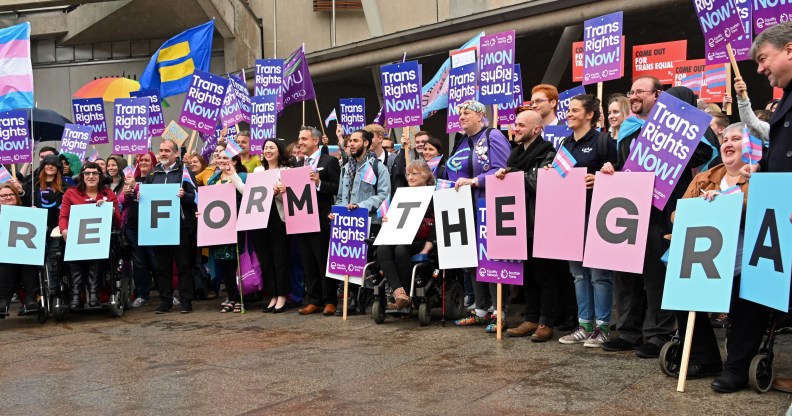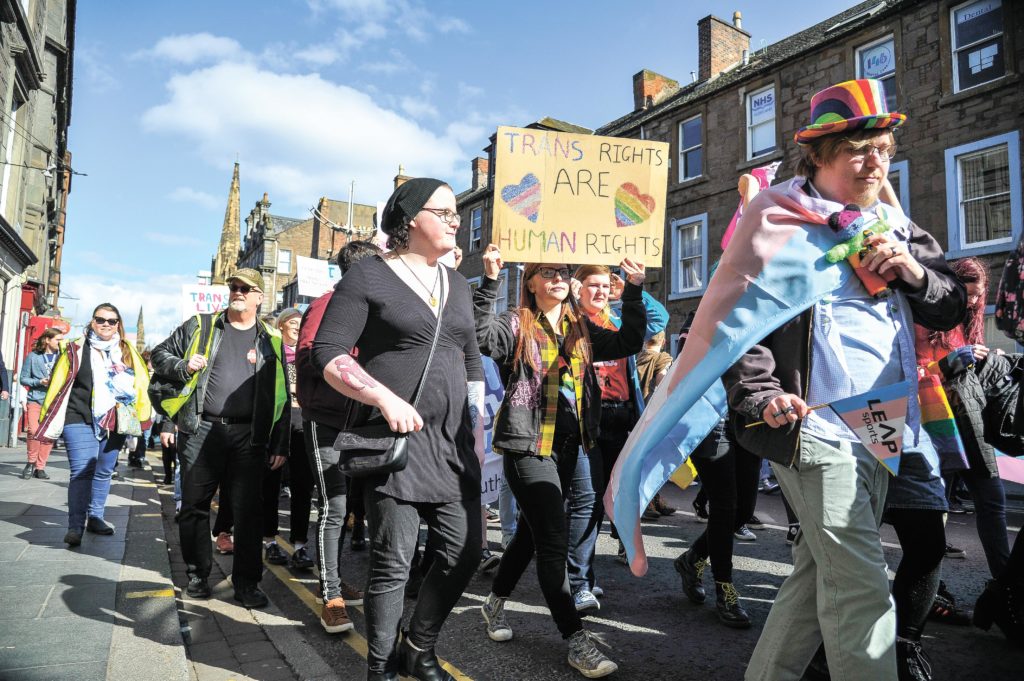The Scottish government just confirmed the next step for the reformation of the Gender Recognition Act

Protesters demonstrate outside the Scottish Parliament for reform of the GRA on June 12, 2019 in Edinburgh. (Ken Jack/Getty Images)
The Scottish government today confirmed plans for a second consultation on the Gender Recognition Act.
It will be a relief for many supporters of a bill that could vastly improve how trans and non-binary people acquire a Gender Recognition Certificate.
Although some remain nervous, as a public consultation may alter a bill which many campaigners view as urgently needed.
This comes after Scottish lawmakers put an update to the GRA on hold amidst feedback from trans rights groups and backlash from anti-trans campaigners.
First minister Nicola Sturgeon of the SNP confirmed a second consultation as part of the Programme of Government, which outlines legislative plans for the year ahead.
.@scotgov confirm their plans for a second consultation on the Gender Recognition Act in today’s programme for government. The GRA needs urgent reform – trans communities must be recognised and respected.
#ScotPfG #ComeOutForTransEquality #defendtransrights
— Stonewall Scotland (@StonewallScot) September 3, 2019
“We will consult on the detail of a draft Gender Recognition Bill by the end of this year, setting out our proposals to reform the current process of obtaining a Gender Recognition Certificate and how we will bring Scotland into line with international best practice,” the Programme stated.
Holyrood lawmakers will publish a draft bill by the end of the year, according to the Programme.
Moreover, the civil partnerships bill that will broaden the legal union to mixed-sex couples will also be tabled.
What does this mean?
The GRA reform bill has quite the journey ahead of it.
A public consultation will soon be held which will iron out key details about the bill. This is not a re-do of the first consultation, which focused on broader topics.
After this, the bill will be timetabled. Moreover, a report called the “Equality Impact Assessment” will be published alongside the bill.
But the bill, originally due by the end of the year, will now be delayed until next year, it was announced today by the Scottish Equality Network over Twitter.
This news comes after lawmakers held the first consultation from 9 November 2017 to 1 March 2018, receiving 15,697 responses.
A 62 percent majority said that Scotland should take action to legally recognise non-binary people.

Trans Pride march in Dundee, Scotland, 2019. (Stewart Kirby/ Getty)
However, the draft bill will no longer extend legal recognition to non-binary people, as had been proposed in the last consultation and as was backed by the Scottish people.
The second public consultation will seek views on:
- Whether the minimum age of applicants should be reduced from 18 to 16.
- What support is needed for children and young people who are uncertain of their gender identity.
For years, trans rights groups had called for the 2004 bill to be reformed.
Currently, trans people who wish to change their legally-recognised gender are able to apply under the GRA.
However, the measure demands that applicants ‘prove’ they are trans, often through psychiatric and medical diagnoses that trans groups argue are often invasive.
Moreover, the applicant must prove they have lived as their true gender for at least two years.
As a result, many trans rights groups are calling for the government to move to a self-declaration system.
They argue the right to self-determination will streamline and simplify the currently clunky and lengthy administrative process.
In addition, campaigners are calling for the government to lower the minimum age to recognise the rights of young trans people.
#DefendsTransRights
Moreover, as MSPs returned back to their desks after the summer recess, trans activists got back to work, too.
Tagged across Twitter as #DefendsTransRights, activists took to the Scottish parliament building on Parliament Green by Horse Wynd to unfurl trans Pride flags as part of a three-day protest, according to Scotman.
We have now put up our newest massive trans flag outside @ScotParl Anyone in the area come by and talk to us about why we need to #defendtransrights pic.twitter.com/rU4ej626tj
— Scottish Trans (@ScottishTrans) September 3, 2019
Scottish Trans Alliance unrolled a massive trans Pride flag on the parliamentary grounds which read: ‘Defends Trans Rights, Our Lives Are Real.’
The fox boy has a message from the wee county: defend the rights of trans people in rural areas #clackmannanshire #defendtransrights pic.twitter.com/BnaulDTzLr
— Sarah Anderson (@andospeaks) September 3, 2019
But the flags were not just waved in the capital. From small, rural towns to on the border of the A1 motorway, activists called on Scottish lawmakers to defend trans rights.
One group at the forefront of campaigning is Scottish Trans Alliance.
A spokesperson told PinkNews: “It is really important that this next consultation focuses on the technicalities of the Bill they plan to pass.
“There has already been a large public consultation on reforming the Gender Recognition Act, in which Scottish respondents were two to one in favour of making the process fairer and easier for trans people.
“We urge the Scottish Government to publish this next consultation as soon as possible, to ensure they can deliver on their manifesto commitment to reform the Gender Recognition Act in this parliamentary term.
“Any further delays will simply provide more space for some of the inaccurate and harmful conversations we have seen around trans equality to continue, and leadership on this topic is more important than ever.”

